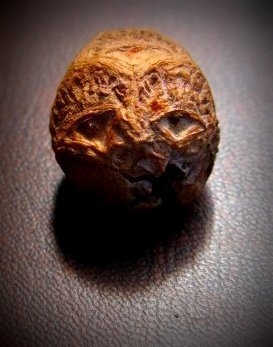Sentimental Journey: Cypress

I meant to take a look at my old dorm. Everything I
passed on campus was nostalgic. Here was the grassy slope where I had ditched
class to sit talking with a young woman named for a painter. Here was the time
capsule, left by the generation of students before mine and meant for those yet
unborn, jutting like a marble mushroom into the geometry of the flower garden.
And here, almost the last thing to see before my dorm, was Theta Pond.
The pond is eternally haunted by my memory of the
first weekend I spent at college: sitting on a bench in my loneliness, soothed
by the waters and the shade, wishing, paradoxically, for greater solitude—for I
had never felt at home since we left our country house on the High Plains, and
here I was in a town of tens of thousands, where trees loomed all around. And
as I sat feeling lonely and admiring a wooden footbridge that spanned a part of
the pond, a rat emerged from beneath it and foraged at its footed support. I
took it as an emblem of despair.
Often in the past I have regretted being such a fool
when I was young, but on this sentimental journey I wasn’t so hard on my former
self. I felt tender toward him. He’s young enough to remind me of my sons. I
chose a bench of weathered boards in old-fashioned cement, one that might
feasibly have been the very one from that lonely memory. The pond has parts
that flow into each other, and several bridges, and many cypresses, and a
dedicatory slab—none of that was clear in my memory. I looked at the particular
footbridge; it was ratless. Further out, however, a white duck with chocolate
trim inverted itself in the water and paddled its fleshy legs like mad against
the air and finally righted itself with something stringy hanging from its
beak.
I took a berry fallen from a cypress, and a lichened
flake of its bark. Something to remember it by. And then I sat on a bench,
drenched in a sadness beyond my power to describe, but a kinder sadness than
the one I’d felt when I was young. And as I sat a detail with no nostalgia
value finally made its way into my attention: a police car with active lights.
In fact I had noticed it when I arrived at the pond and assigned it no
particular significance; I suppose I thought someone had been caught speeding.
Now I noticed that the police car with active lights
was not singular. And I became aware of something that was, I think, obvious,
if I hadn’t been so drenched in memory: That all along the avenue something
solemn was going on. Yellow police tape, and cops stationed on foot at each
compass point, facing outward, hands on their belts, staring at nothing. An
ambulance; many other cop cars. I counted a dozen sets of rotating lights.
Something awful had happened—just before I arrived for my reverie, as it turns
out. I wandered up. A motorcycle lay on its side. A huge planter stood beside
the crosswalk. Ceramic pieces of the planter lay broken out. Skid marks
suggested the geometry: the bike had hit a speed bump, ricocheted off the
planter, and come to rest twenty feet beyond. Next to the planter lay a sheet
covering a shape, but the sheet looked like a Japanese flag, for a red sun
coincided with the human head beneath.
I asked other rubberneckers what had happened.
Someone said the cyclist had been fleeing police when he hit the speed bump. (Next
morning, the campus newspaper quoted the police as denying the pursuit.) I
stood there as the afternoon mellowed into dusk. The red and blue lights kept
turning. The police moved within their cordon, seeming to accomplish nothing.
The sap of the cypress lay in the whorls of my fingers, too viscous to rub
away.
Related Posts:
Sentimental Journey: An Abandoned House
Edgar Allan Poe's Trees
Photo: "Cypress Pod as Human Head" by Parker Grice

Published on September 17, 2012 02:30
No comments have been added yet.





